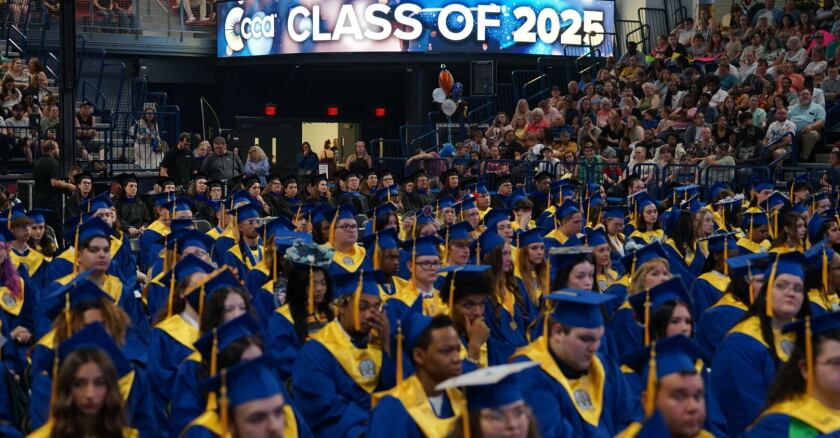Science
Pennsylvania Budget Negotiations Impact Cyber Charter School Funding

Discussions in Harrisburg regarding the funding of Pennsylvania’s cyber charter schools have significant implications for local property taxes and the quality of education. The negotiations involve Governor Josh Shapiro and legislative leaders, focusing on a proposal to reform the funding model for these schools amid a tight state budget.
The current system allows cyber charter schools to be funded through local and state tax dollars, which flow through local school district budgets. Recently, the Democratic-led House passed legislation that would impose a cap of $8,000 per student for tuition. This reform is projected to prevent approximately $250 million from being transferred to cyber charters from local districts. Despite passing in the House, the bill garnered support from only two Republican lawmakers and faces uncertainty regarding its acceptance in the Republican-led Senate.
During the debates, some Democratic representatives contended that cyber charters currently enjoy excessive funding and are not using it efficiently. Rob Gleason, president of the Westmont Hilltop School Board, remarked that cyber schools overspend in comparison to their operational needs, stating, “Their excess of revenue over expenses is criminal.” Conversely, Republicans such as Roman Kozak, the only Pennsylvania legislator with prior experience teaching at a cyber school, emphasized the unique costs associated with running these institutions, including cybersecurity measures and student data protection.
The funding debate has been fueled by conflicting narratives about the financial needs of cyber charter schools. Critics argue that the proposed 20 percent funding cut serves as a means to eliminate educational choice for over 70,000 students currently enrolled in cyber schools. In contrast, advocates for reform claim that the existing funding structure disproportionately benefits cyber charters at the expense of local districts.
To clarify the financial landscape, PennLive conducted an analysis using detailed financial data from the Pennsylvania Department of Education for the 2023-2024 school year. The findings reveal that many arguments surrounding the funding of cyber charters are based on misconceptions. For instance, while it is often claimed that cyber schools receive only 70-75 percent of the funding that traditional public schools do, the reality is more nuanced. When accounting for additional funding for special education students, the disparity narrows to 93 percent of the funding received by traditional schools.
According to Timothy Shrom, director of research at the Pennsylvania Association of School Business Officials, the inconsistency in education funding has been exacerbated by the varying rates at which districts have utilized federal COVID-relief funding. This makes it difficult to draw accurate comparisons across districts.
Funding formulas for cyber charters also come under scrutiny. Each local district calculates the amount it spends on education and divides it by the number of students to determine charter school tuition rates. As a result, there are around 500 different tuition rates across Pennsylvania, which can lead to discrepancies in what cyber schools receive compared to traditional public schools.
Critics of the current system argue that the deductions allowed for certain expenses, such as building maintenance and student transportation, unfairly inflate the amounts paid to traditional districts while underfunding cyber schools. Michael Whisman, president of Vertex Education, advocates for recognizing the costs cyber schools incur, such as reimbursing parents for internet expenses.
Further complicating the funding debate are the financial implications of special education students. Cyber charter schools receive approximately double the funding for each special education student compared to their regular education counterparts. Critics argue that this creates incentives for cyber charters to enroll students with less severe disabilities to maximize profits, resulting in a significant financial burden on the education system.
Legislators have begun addressing disparities in special education funding, with proposals aimed at tying payments to the severity of disabilities rather than using a flat rate. This adjustment is intended to ensure that funding reflects the actual costs of services provided to students with disabilities.
As budget negotiations continue, the outcome will have lasting repercussions not only for the future of cyber charter schools but also for the local school districts that serve as their financial backbone. The discussions highlight the complexities of education funding in Pennsylvania and the urgent need for a solution that balances the needs of all students.
-

 Entertainment2 months ago
Entertainment2 months agoIconic 90s TV Show House Hits Market for £1.1 Million
-

 Lifestyle4 months ago
Lifestyle4 months agoMilk Bank Urges Mothers to Donate for Premature Babies’ Health
-

 Sports3 months ago
Sports3 months agoAlessia Russo Signs Long-Term Deal with Arsenal Ahead of WSL Season
-

 Lifestyle4 months ago
Lifestyle4 months agoShoppers Flock to Discounted Neck Pillow on Amazon for Travel Comfort
-

 Politics4 months ago
Politics4 months agoMuseums Body Critiques EHRC Proposals on Gender Facilities
-

 Business4 months ago
Business4 months agoTrump Visits Europe: Business, Politics, or Leisure?
-

 Lifestyle4 months ago
Lifestyle4 months agoJapanese Teen Sorato Shimizu Breaks U18 100m Record in 10 Seconds
-

 Politics4 months ago
Politics4 months agoCouple Shares Inspiring Love Story Defying Height Stereotypes
-

 World4 months ago
World4 months agoAnglian Water Raises Concerns Over Proposed AI Data Centre
-

 Sports4 months ago
Sports4 months agoBournemouth Dominates Everton with 3-0 Victory in Premier League Summer Series
-

 World4 months ago
World4 months agoWreckage of Missing Russian Passenger Plane Discovered in Flames
-

 Lifestyle4 months ago
Lifestyle4 months agoShoppers Rave About Roman’s £42 Midi Dress, Calling It ‘Elegant’









